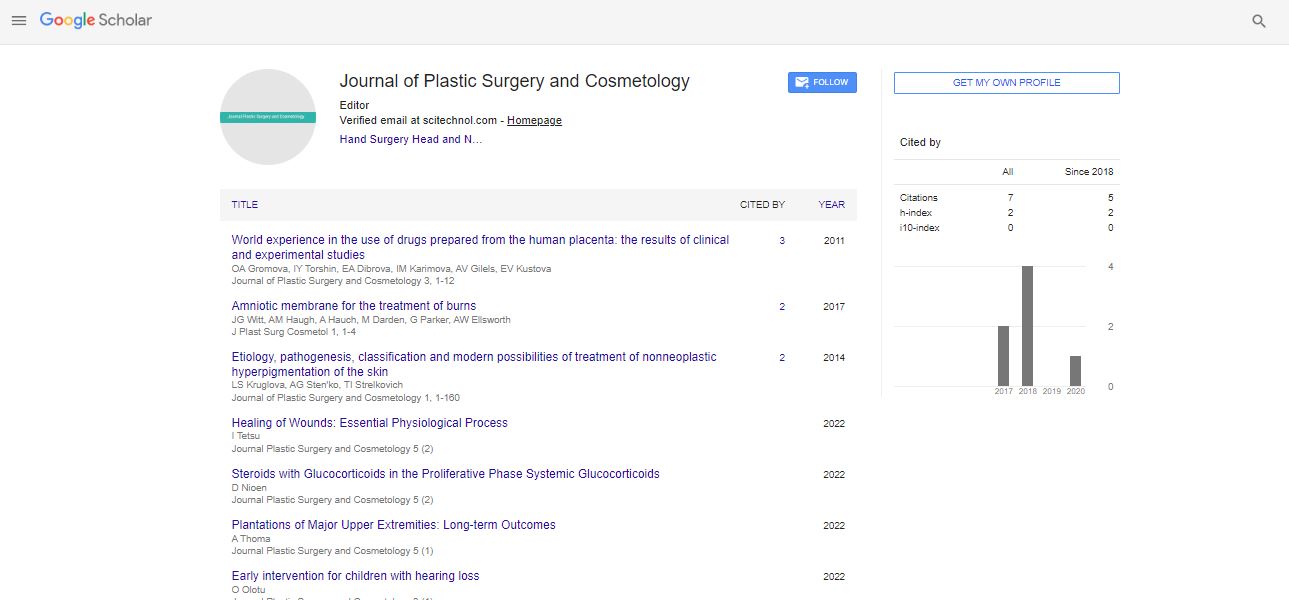Commentary, J Pls Sur Cos Vol: 4 Issue: 2
A Drastic Change in Teens due to Plastic Surgery
Fleming Rowling*
Department of Plastic Surgery, Jordan Health University, Jordan
*Corresponding Author: Fleming Rowling Department of Plastic Surgery, Jordan Health University, Jordan, E-Mail: Rowling123@au.edu
Received: 03 December, 2021; Accepted: 17 December, 2021; Published: 24 December, 2021
Keywords: Plastic Surgery and Cosmetology
Commentary
Just because the name includes the word"plastic"does not mean cases who have this surgery end up with a face full of fake stuff. The name is not taken from the synthetic substance but from the Greek word plastikos, which means to form or fester (and which gives the material plastic its name as well).
Plastic surgery is a special type of surgery that can change a person's appearance and capability to serve.
Reconstructive procedures correct blights on the face or body. These include physical birth blights like cleft lips and palates and observance scars, traumatic injuries like those from canine mouthfuls or becks, or the fate of complaint treatments like rebuilding a woman's bone after surgery for bone cancer.
Cosmetic ( also called aesthetic) procedures alter a part of the body that the person isn't satisfied with. Common ornamental procedures include making the guts larger ( addition mammoplasty) or lower ( reduction mammoplasty), reshaping the nose (rhinoplasty), and removing pockets of fat from specific spots on the body (liposuction). Some ornamental procedures are not indeed surgical in the way that utmost people suppose of surgery - that is, cutting and suturing. For illustration, the use of special spotlights to remove unwanted hair and grinding skin to ameliorate severe scarring are two similar treatments.
Utmost teens don't, of course. But some do. Interestingly, the American Society of Plastic Surgeons (ASPS) reports a difference in the reasons teens give for having plastic surgery and the reasons grown-ups do Teens view plastic surgery as a way to fit in and look respectable to musketeers and peers. Grown-ups, on the other hand, constantly see plastic surgery as a way to stand out from the crowd.
According to the ASPS, further than people 19 times and youngish had either major or minor plastic surgical procedures in 2013.
Some people turn to plastic surgery to correct a physical disfigurement or to alter a part of the body that makes them feel uncomfortable. For illustration, guys with a condition called gynecomastia ( redundant bone towel) that does not go down with time or weight loss may conclude for Some people turn to plastic surgery to correct a physical disfigurement or to alter a part of the body that makes them feel uncomfortable. For illustration, guys with a condition called gynecomastia ( redundant bone towel) that does not go down with time or weight loss may conclude for
Other people decide they want a ornamental change because they ’re not happy about the way they look. Teens who have ornamental procedures - similar as otoplasty (surgery to leg back cognizance that stick out) or dermabrasion (a procedure that can help smooth or disguise severe acne scars) - occasionally feel more comfortable with their appearance after the procedure.
The most common procedures teens choose include nose reshaping, observance surgery, acne and acne scar treatment, and bone reduction
Reconstructive surgery helps repair significant blights or problems. But what about having ornamental surgery just to change your appearance? Is it a good idea for teens? As with everything, there are right and wrong reasons to have surgery.
Cosmetic surgery is doubtful to change your life. Utmost board- certified plastic surgeons spend a lot of time canvassing teens who want plastic surgery to decide if they're good campaigners for the surgery. Croakers want to know that teens are emotionally mature enough to handle the surgery and that they are doing it for the right reasons.
Numerous plastic surgery procedures are just that - surgery. They involve anesthesia, crack mending, and other serious pitfalls. Croakers who perform these procedures want to know that their cases are able of understanding and handling the stress of surgery.
Some croakers will not perform certain procedures (like rhinoplasty) on a teen until they're sure that person is old enough and has finished growing. For rhinoplasty, that means about 15 or 16 for girls and about a time aged for guys.
Girls who want to enlarge their guts for ornamental reasons generally must be at least 18 because saline implants are only approved for women 18 and aged. In some cases, however, similar as when there is a tremendous size difference between the guts or one bone has failed to grow at each, a plastic surgeon may get involved before.
Acknowledgement
The authors are grateful to the journal editor and the anonymous reviewers for their helpful comments and suggestions.
Conflict of Interest
The authors declared no potential conflicts of interest for the research, authorship, and/or publication of this article.
 Spanish
Spanish  Chinese
Chinese  Russian
Russian  German
German  French
French  Japanese
Japanese  Portuguese
Portuguese  Hindi
Hindi 